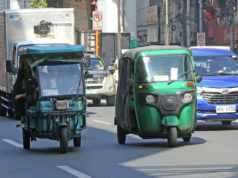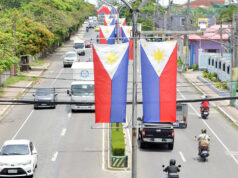Congress empowers Duterte vs virus outbreak
By Charmaine A. Tadalan, Reporter
and Genshen L. Espedido
LAWMAKERS approved a bill giving President Rodrigo R. Duterte special powers to deal with a novel coronavirus pandemic that has sickened hundreds in the Philippines and threatens to bring the economy to a standstill.
Senators and congressmen approved their own versions of the bill from late Monday night to early Tuesday morning that both declared a state of national emergency and gave the President more than two dozen powers amid rising cases of infection.
Congressmen later adopted the Senate version, doing away with the need to reconcile conflicting provisions in a bicameral conference committee.
Mr. Duterte only needs to sign the measure to turn it into a law.
The Senate bill allows Mr. Duterte to realign savings from the 2020 budgets of agencies under the Executive branch.
The original draft measure from Malacañang had authorized the President to reprogram any appropriations in the national budget, which legal experts said was unconstitutional.
“The total emergency subsidy program will require a total of P97.4 billion per month, or around P200 billion pesos for two months for all the households working in the informal sector, plus P5.1 billion of administrative cost,” Senator Pia S. Cayetano, who heads the ways and means committee, said in her sponsorship speech on Monday night.
The President’s special powers will be in effect for three months unless Congress withdraws them sooner.
The Senate measure also struck down the original proposal to give Mr. Duterte sweeping powers to “take over” public utilities and private businesses during the national emergency.
Instead, it limited his power to directing the operations of private hospitals and medical facilities to house health workers and serve as quarantine areas. The President may also direct the operations of public transportation to ferry frontliners.
The bill will give 18 million low-income households an emergency cash aid worth P5,000 to P8,000 for two months, depending on a region’s minimum wage.
Under the measure, public and private health workers will get P100,00 in compensation if they are severely infected with the coronavirus disease 2019 (COVID-19).
Their families will get P1 million if they get infected and die. The clause will be applied retroactively. Health workers will also get a special COVID-19 risk allowance on top of their regular hazard pay.
The proposed law allows the President to quicken the approval of testing kits and testing of persons under investigation and monitoring, as well as the isolation and treatment of patients. He will also ensure that local governments follow the rules set by the National Government.
He will also continue to enforce measures against hoarding, profiteering, price manipulation and other illegal acts that could affect the supply and distribution of food and other basic goods.
The President will also speed up the procurement of protective gear for health workers, test kits, medical supplies and relief goods. He may also order the construction of temporary hospitals for COVID-19 patients.
Mr. Duterte may also lower lending rates and the reserve requirements for banks, and regulate the distribution of fuel, power and water. He may likewise undertake other measures “as may be reasonable and necessary” to respond to the pandemic.
The approved bill would still allow Mr. Duterte to “take over” privately owned establishments, Michael Henry Ll. Yusingco, a lawyer and research fellow at the Ateneo de Manila University Policy Center, said in an e-mail.
“The conditions set by the bill serve as a limitation to the exercise of the authority, but without a doubt this provision authorizes the President to exercise takeover power,” he said.
Mr. Yusingco added that the inclusion of the provision was “ill-advised.” He said that “Addressing the COVID-19 crisis entails a lot of work for the government. None of this is helped by putting a draconian measure such a takeover clause in a bill that claims to be an expression of the bayanihan spirit.”



